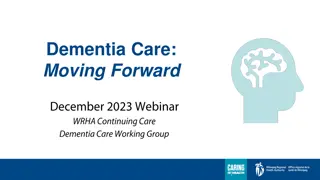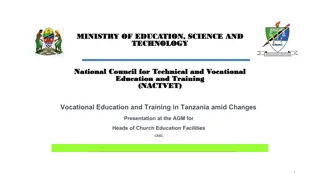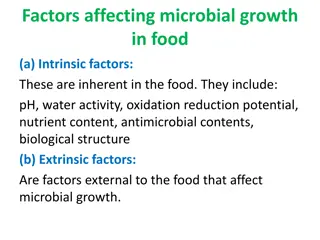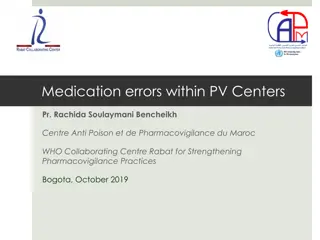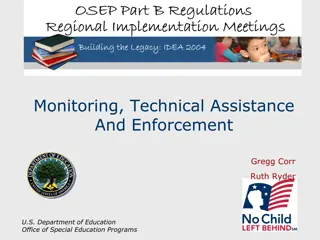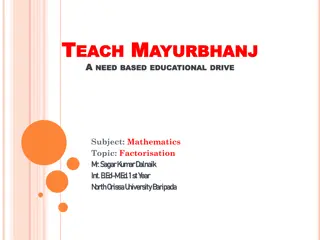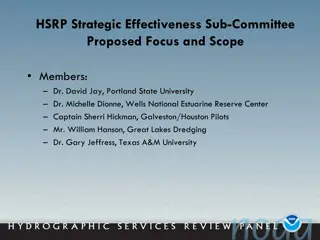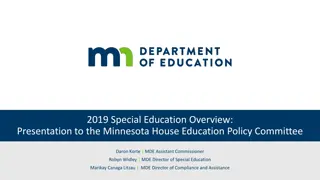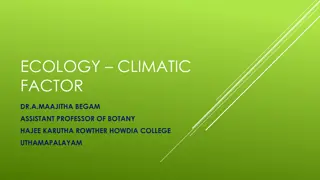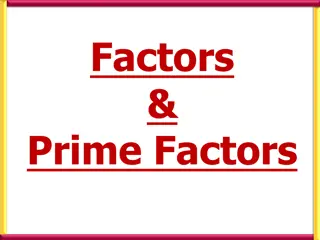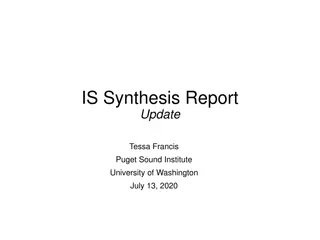Improving Education: Key Factors and Strategies
Education plays a vital role in shaping the future, with the purpose of empowering individuals, transmitting culture, preparing for citizenship and work. Teacher quality significantly impacts student learning speed and progress. Effective strategies to enhance teacher quality include raising entry standards, improving support, and focusing on retention. Research suggests expertise in teaching aligns with expertise in other domains, emphasizing the importance of teacher quality for student outcomes.
Download Presentation

Please find below an Image/Link to download the presentation.
The content on the website is provided AS IS for your information and personal use only. It may not be sold, licensed, or shared on other websites without obtaining consent from the author.If you encounter any issues during the download, it is possible that the publisher has removed the file from their server.
You are allowed to download the files provided on this website for personal or commercial use, subject to the condition that they are used lawfully. All files are the property of their respective owners.
The content on the website is provided AS IS for your information and personal use only. It may not be sold, licensed, or shared on other websites without obtaining consent from the author.
E N D
Presentation Transcript
Teacher learning: The key to improving the world!
What is the purpose of education? 2 Four main philosophies of education/development Personal empowerment Cultural transmission Preparation for citizenship Preparation for work All are important Any education system is a (sometimes uneasy) compromise between these four forces ?
What determines how quickly children learn? 3 Student characteristics School organization Teaching quality The quality of the curriculum The time teachers have to plan teaching The size of classes The resources available The skills of the teacher All of these are important, but the quality of the teacher is especially important ?
What does this mean for student progress? 4 Take a group of 50 teachers: Students taught by the most effective teacher in that group of 50 teachers learn in six months what those taught by the average teacher learn in a year Students taught by the least effective teacher in that group of 50 teachers will take two years to achieve the same learning And furthermore: In the classrooms of the most effective teachers, students from disadvantaged backgrounds learn at the same rate as those from advantaged backgrounds (Hamre & Pianta, 2005) ?
Approaches to improving teacher quality 5 Replace existing teachers with better ones Raise the bar for entry into the profession Raise the bar for transfers Increase vacancies by removing less effective teachers Increase retention of more effective teachers Help existing teachers improve The love the one you re with strategy It can be done provided we focus rigorously on the things that matter even when they re hard to do ?
Can teachers improve 6 Research shows expertise in teaching shares the hallmarks of expertise in other domains More importantly, for the general expertise research not to apply to teaching: All the other areas would have to be similar, and Teaching would have to be different This seems unlikely, so As far as we can tell, what is true for expertise in other areas is likely to be true for teaching. ?
Evaluation vs. improvement 7 Evaluation frameworks: of necessity, have to be comprehensive include all aspects of teachers work at best, incentivize improvement on all aspects of practice at worst, incentivize improvement on aspects of practice that are easy to improve Improvement frameworks: are selective focus on those aspects of practice with the biggest payoff for students To maximize improvement, evaluation frameworks have to be used selectively ?
Why Formative Assessment? 8 A principle and an uncomfortable fact about the world The principle: "If I had to reduce all of educational psychology to just one principle, I would say this: The most important single factor influencing learning is what the learner already knows. Ascertain this and teach him [or her] accordingly (Ausubel, 1968 p. vi) The uncomfortable fact: Students do not learn what we teach. What is learning? Learning is a change in long-term memory (Kirschner et al., 2006) The fact that someone can do something now does not mean they will be able to do it in six weeks, but If they cannot do something now, it is highly unlikely they will be able to do it in six weeks ?
Looking at the wrong knowledge 9 The most powerful teacher knowledge is not explicit: That s why telling teachers what to do doesn t work. What we know is more than we can say. And that is why most professional development has been relatively ineffective. Improving practice involves changing habits, not adding knowledge: That s why it s hard: And the hardest bit is not getting new ideas into people s heads. It s getting the old ones out. That s why it takes time. But it doesn t happen naturally: If it did, the most experienced teachers would be the most productive, and that s not true (Hanushek & Rivkin, 2006). ?
Supportive accountability 10 What is needed from teachers: A commitment to: The continual improvement of practice Focus on those things that make a difference to students What is needed from leaders: A commitment to engineer effective learning environments for teachers by: Creating expectations for continually improving practice Keeping the focus on the things that make a difference to students Providing the time, space, dispensation, and support for innovation Supporting risk-taking ?





